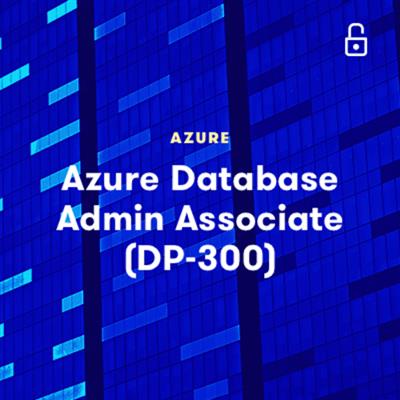Udemy - DP-300 Administering Relational Databases - Azure DBA
"softddl.org"
1-10-2021, 17:07
-
Share on social networks:
-
Download for free: Udemy -
-

MP4 | Video: h264, 1280x720 | Audio: AAC, 44.1 KHz, 2 Ch
Genre: eLearning | Language: English + srt | Duration: 138 lectures (14h 20m) | Size: 4.8 GB
Learn DBA skills for Azure SQL Databases, SQL Managed Instances and SQL Server on Azure Virtual Machines. Exam DP-300

MP4 | Video: h264, 1280x720 | Audio: AAC, 44.1 KHz, 2 Ch
Genre: eLearning | Language: English + srt | Duration: 138 lectures (14h 20m) | Size: 4.8 GB
Learn DBA skills for Azure SQL Databases, SQL Managed Instances and SQL Server on Azure Virtual Machines. Exam DP-300
What you'll learn:
Plan and implement data platform resources
Implement a secure environment
Monitor and optimize operational resources
Optimize query performance
Perform automation of tasks
Plan and implement a High Availability and Disaster Recovery (HADR) environment
Perform administration by using T-SQL
Requirements
You will need to already be familiar with the 6 principal clauses of the SELECT statement - SELECT, FROM, WHERE, GROUP BY, HAVING and ORDER BY
It will also be good if you have had prior experience with Azure - but this is not essential.
A lot of this course will use SQL Server Management Studio (SSMS). The latest version requires 64-bit Windows, but you could use SSMS 17.9.1 if you have 32-bit Windows.
If you have a Mac, then you can use Azure Data Studio for querying, but that doesn't have all of the management capabilities of SSMS.
For accessing the Azure portal, you will also need an internet browser (Edge or Chrome preferred).
There is a 30-day refund guarantee of this Udemy course (see Udemy's refund policy).
Why not have a look at the curriculum below and see what you can learn?
Description
This course covers the content required for the DP-300 certification exam, current as per the DP-300 exam update of 24 September 2021.
This course teaches the requirements for the Microsoft Certificate DP-300 "Administering Relational Databases on Microsoft Azure", and focuses on administrating Azure SQL Databases, Azure SQL Managed Instances, and SQL Server on Azure Virtual Machines. We concentrate for most of the course on Azure SQL Databases, and then look at the additional functionality for Managed Instances and SQL Server on Azure Virtual Machines.
In the first part of this course we will be concentrating on the Azure SQL Database. We'll start off with getting a free trial of Azure, installing SQL Server Management Studio, and briefly reviewing the 6 principal clauses of the SELECT statement. We will then look at how to optimize query performance and evaluate performance improvements.
We will then look at the various Data Platform Resources and how they compare. Following this, we will have a deep dive into configuring Azure SQL Database resources for scale and performance, including serverless and provisioned, vCore and DTU, and database partitioning techniques. We will then evaluate strategies for migrating to Azure.
Then we look at how to implement a secure environment for your Azure SQL Database. We will look at how to configure database authentication and authorization by using platform and database tools; how to Implement security for data at rest and in transit; and how to implement compliance controls for sensitive data.
After this, we will look at how Monitor and Optimize Operational Resources. This includes Monitoring activity and performance, implementing performance-related maintenance tasks, and identifying performance-related issues.
Lastly for Azure SQL Database, we will look at how to Automate tasks and Perform backup and restore a database by using database tools, Recommend an HADR strategy for a data platform solution, and more about Performing Administration by Using T-SQL.
In the second part of the course, we will turn to Virtual Machines and Managed Instances and those features which are not available in Azure SQL Database. We will start by configuring them and access them, either in SSMS or using a Remote Desktop Connection. Then we'll look at strategies for Upgrading SQL Server, configure database authentication, and filegroups.
We'll Evaluate and implement an alert and notification strategy, Identify performance-related issues using tools we couldn't use in Azure SQL Database, and Create scheduled tasks. Finally, we'll Perform backup and restore a database in Virtual Machines by using database tools, and Recommend, test and configure High Availability and Disaster Recovery strategies.
Some prior knowledge is required, but not much. You'll need to know how to use the Select statement; and it would be helpful, but not essential, if you had a little background in Microsoft Azure.
Some prior knowledge of SQL Server is required. Specifically, you need to know:
How to create a SELECT statement,
How to create views and stored procedures,
How to create backups and restore a database.
This content is available in "98-364: Database Fundamentals", which is published on Udemy.
Additionally, prior knowledge of Azure, such as that shown in Microsoft's DP-900 exam is helpful, but is not required.
Once you have completed this course, you will have a good knowledge of how to administer Azure SQL Databases, Azure SQL Managed Instances, and SQL Server on Azure Virtual Machines. And with some practice, you could even go for the official Microsoft certification DP-300 - wouldn't that look good on your CV or resume?
I hope to see you in the course - why not have a look at what you could learn?
Who this course is for
This course is for you if you want to implement or manage the operational aspects of cloud-native and hybrid data platform solutions built on Azure Data Services and SQL Server
You could be a database administrator or data management specialist that manage on-premises and cloud relational databases built with Microsoft SQL Server and Microsoft Azure Data Services
By the end of this course, after entering the official Practice Tests, you could enter (and hopefully pass) Microsoft's official DP-300 exam.
Wouldn't the "Microsoft Certified: Azure Database Administrator Associate" certification look good on your CV or resume?
Homepage
https://www.udemy.com/course/dp-300-administering-relational-databases-azure-dba/Buy Premium From My Links To Get Resumable Support,Max Speed & Support Me
https://hot4share.com/z13elzkmtitj/48bck.DP300.Administering.Relational.Databases..Azure.DBA.part1.rar.html
https://hot4share.com/f1lkohkrw2bt/48bck.DP300.Administering.Relational.Databases..Azure.DBA.part2.rar.html
https://hot4share.com/jv78q2ynaddo/48bck.DP300.Administering.Relational.Databases..Azure.DBA.part3.rar.html

https://uploadgig.com/file/download/421140e7cBcd3e20/48bck.DP300.Administering.Relational.Databases..Azure.DBA.part1.rar
https://uploadgig.com/file/download/90537334cC68660d/48bck.DP300.Administering.Relational.Databases..Azure.DBA.part2.rar
https://uploadgig.com/file/download/740E067A5ce9416c/48bck.DP300.Administering.Relational.Databases..Azure.DBA.part3.rar

https://rapidgator.net/file/91d9da769885481d58bb78ebe713f7e3/48bck.DP300.Administering.Relational.Databases..Azure.DBA.part1.rar.html
https://rapidgator.net/file/c2ba4dd2d10637b6ac62c20820ca1a96/48bck.DP300.Administering.Relational.Databases..Azure.DBA.part2.rar.html
https://rapidgator.net/file/f06f72c353491e21e54a01dcb89a48e9/48bck.DP300.Administering.Relational.Databases..Azure.DBA.part3.rar.html
Links are Interchangeable - No Password - Single Extraction
The minimum comment length is 50 characters. comments are moderated




